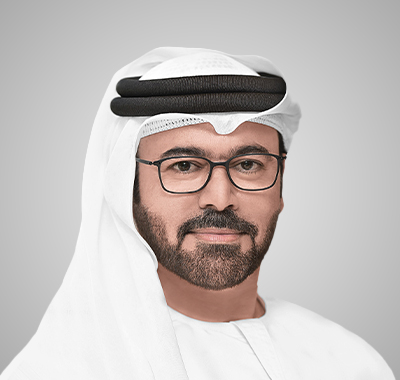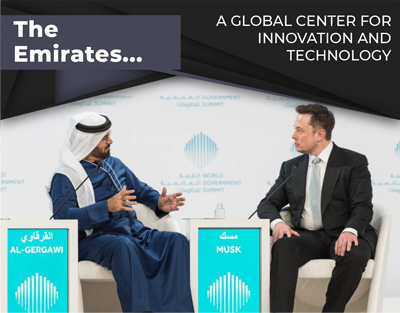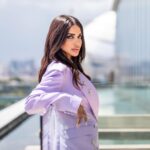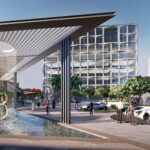Mohammad Al Gergawi is considered one of the contributors to changing the business landscape of Dubai and a government official who holds the positions of the Minister of Cabinet Affairs in the UAE Government, Chairman of the Executive Office in Dubai, Deputy Chairman of the Ministerial Development Council and Deputy Chairman of the Emirates Investment Authority, the UAE Sovereign Wealth Fund.
Mohammad Al Gergawi established and managed projects that were “risky” to begin with. He played a pivotal role in shaping several economic sectors in Dubai, such as the technology, media, financial, healthcare and knowledge-based sectors.
His passion for business began at a young age when he used to accompany his father, who worked in trade, to the Dubai market.
He completed his university education in the United States, where he obtained a bachelor’s degree in Business Administration. Upon his return to the UAE, he joined several institutions, including the Ministry of Finance, the United Nations Development Program office in Dubai Municipality, and then the Department of Economic Development in Dubai. Notably, he spent no more than two years in any institution he headed. He would strengthen its foundations and place its organizational and managerial frameworks and then give way for the next generation of second and third-level leaders.
Mohammad Al Gergawi’s economic principles are based on his firm conviction that innovation and creativity cannot be achieved by resorting to safe choices and walking on well-trodden paths, but rather by taking risks and exploring the roads less traveled. In all the projects he worked on, he moved beyond estate projects to establish a comprehensive “Cluster Economy” that integrates thousands of companies in related fields. The cluster economy would attract hundreds of thousands of talented people in the sectors of knowledge, media, technology, and medicine, and drive Dubai’s economy forward. He developed economic strategies and frameworks that would make Dubai the ideal home to live in and achieve one’s dreams.
The first project he worked on was the Dubai Quality Award in 1994 in which he held the position of Secretary General of the Award. The award aimed for motivating the private sector and various entities in Dubai to apply quality standards in all their operations and develop their performance.. He oversaw the Dubai Shopping Festival in 1996 as the first Festival Coordinator-General, and then the Dubai Summer Surprises. These were truly unconventional projects. Who would have believed that Dubai’s hot summer would turn into a tourism season, bringing Arab, British, and American tourists to Dubai? The festivals caused hotel occupancy rates to exceed 80% during the summer, making the tourism sector one of the most important contributors to Dubai’s GDP.
In the first TV interview for Al Gergawi in 1996, the anchor asked: How can Dubai confidently step into these tourism projects, despite the numerous challenges? He answered: Some cities in America have active and thriving tourism despite their hot desert climate. There is nothing to prevent us from being like that, and we have the capabilities to turn Dubai into a tourist destination!
In 1999, he revealed a big dream that the city aspires. When the anchor asked him during an interview whether there was a dream for Dubai to develop its technology sector, he said, as if looking into the future, “We indeed aspire to transform Dubai into the Silicon Valley of the Middle East. It is achievable by developing the education sector, as technology is the future.” This answer was cemented in reality years later.
At the end of 1999, Dubai revealed several projects aimed at solidifying its position as a developed and international city. On October 29, 1999, His Highness Sheikh Mohammed bin Rashid Al Maktoum, Crown Prince of Dubai at the time, announced the Dubai Internet City project “Dream and Risk!” to be a strategic base for technology companies targeting emerging markets.
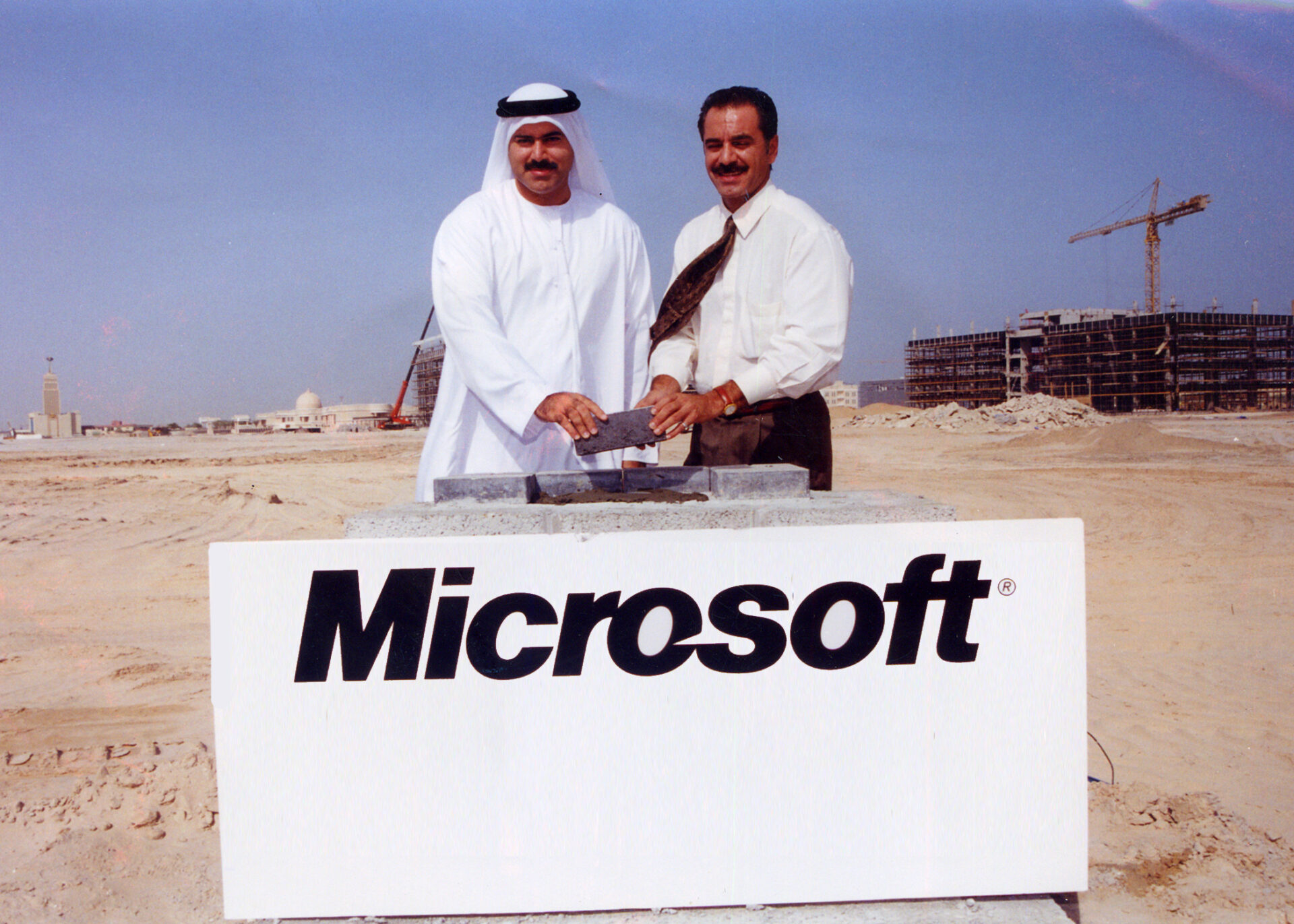 Mohammad Abdullah Al Gergawi and Microsoft’s CEO laying the foundation stone for the company in Dubai Internet City in 2002
Mohammad Abdullah Al Gergawi and Microsoft’s CEO laying the foundation stone for the company in Dubai Internet City in 2002
It is worth noting that the project coincided with the Internet bubble or the dot-com bubble that disheveled global markets. However, the work did not cease because the vision for His Highness went beyond the limits of this bubble. His Highness commissioned Mohammad Al Gergawi to build Dubai Internet City within 365 days. The challenge was the lack of a government budget for the project, so it was funded with a $200 million loan from HSBC Bank. He began working on creating a complete integrated infrastructure and inviting international technology companies to launch their offices in Dubai, which at that time exceeded 100 companies, such as Microsoft, Oracle, Cisco Systems, and Sony Ericsson. The total investments of the licensed companies were estimated at $700 million. As a result of this forward-looking vision, today Dubai Internet City includes 1,600 companies and 32,000 technology professionals and entrepreneurs.
Across from Dubai Internet City, His Highness directed Mohammad Abdullah Al Gergawi to establish a media city, “Dubai Media City“, based on the deep knowledge of His Highness that the technology and media sectors would merge. The city today possesses more than 4,000 companies and 33 thousand specialists in the media sector. It contains the regional headquarters of international news agencies and TV networks.
Within two decades, the dream was achieved, and Dubai’s Silicon Valley began to draw investors’ attention. Billion-dollar deals took place there, such as Uber’s acquisition of Careem for 11 billion dirhams, Amazon on Souq.com for two billion dirhams, and the Media.net deal for 3.3 billion dirhams.
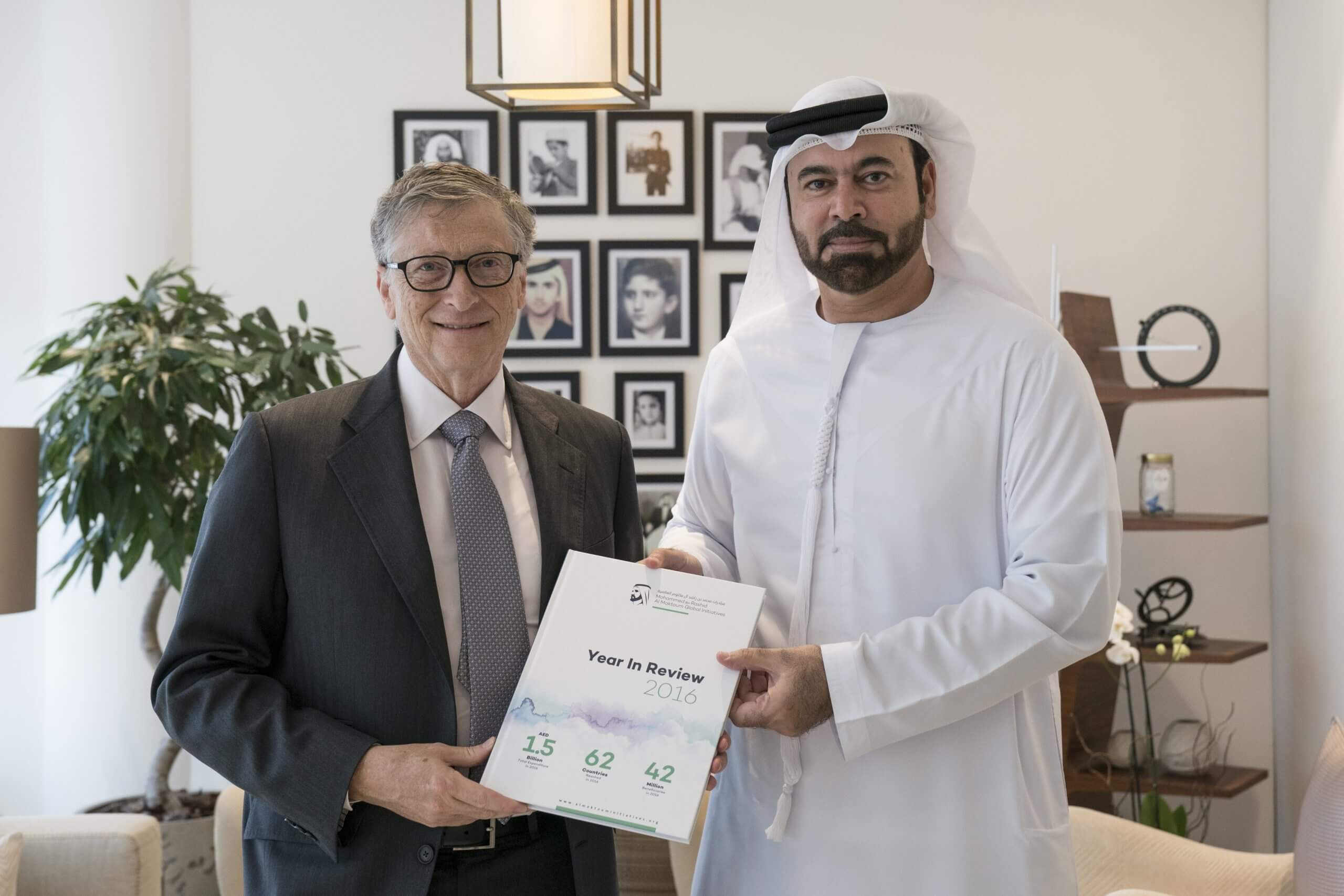 Mohammad Abdullah Al Gergawi and Bill Gates in 2017
Mohammad Abdullah Al Gergawi and Bill Gates in 2017
Mohammed bin Rashid preceded other leaders with a vision that was ahead of its time. Dubai entered the new millennium with a great ambition and an unshakable goal, to become a global capital of money and business.
Thus, His Highness entrusted Mohammad Al Gergawi with the establishment of the Dubai Financial Center in 2002. The DFC’s prominence has grown over the years, today becoming one of the most important global financial centers with 3,644 active companies in 2021. One of the most important milestones witnessed by the center was the launch of (NASDAQ Dubai) in 2008, in partnership with NASDAQ OMX.
To attract foreign investments to Dubai, Sheikh Mohammed bin Rashid assigned him with the establishment of the Dubai Development and Investment Authority in 2002. During this time, he managed the establishment of Dubai Healthcare City, the Energy Stock Exchange, the Mohammed Bin Rashid Establishment for SME Development, the International Investment Forum, Dubai Industrial City, the International City for Humanitarian Services, and other projects.
Al Gergawi says that he and his work teams have never worked as employees, but as entrepreneurs, with an entrepreneurial spirit that embraces persistence, risk-taking, learning from mistakes, and focusing on results.
In 2004, he took over the establishment of Dubai Holding Company with the aim of managing a group of mega projects and development initiatives that were launched in the late 1990s. Dubai Holding has succeeded in becoming a key driver in Dubai’s economy. He also worked on launching the TECOM Group, which manages 10 specialized business complexes that focus on vital sectors in strategic areas in Dubai. The group was recently listed on the Dubai Financial Market, with a value of approx. 13.4 billion dirhams. He also worked on launching Dubai Real Estate Group, Emirates Integrated Telecommunications Company (du), and Emirates Central Cooling Systems “Empower”, the largest provider of district cooling services in the world, whose market value upon listing on the Dubai Financial Market exceeded 13 billion dirhams. Within these complexes and companies, he worked on establishing several projects to support the national economy in various sectors.
In the media sector, he supervised the establishment of the Arab Media Group ‘AMG’, the Arab Radio Network, Emarat AlYoum newspaper, Dubai Studio City, and Dubai Production City. In the education sector, he worked on establishing Dubai Knowledge Park and Dubai International Academic City. In the science sector, he worked on establishing the Dubai Science Park. He also supervised the foundation of Dubai Design District d3 in the design sector and Dubai Outsourcing City in the ICT sector. As for the real estate sector, as part of the Dubai Properties Group, he managed the Marassi Business Bay project and the implementation of the first phase of the Dubai Water Canal project. In the hospitality sector, he contributed to the development and expansion of the Jumeirah Group globally. He has also led several smart city projects worldwide.
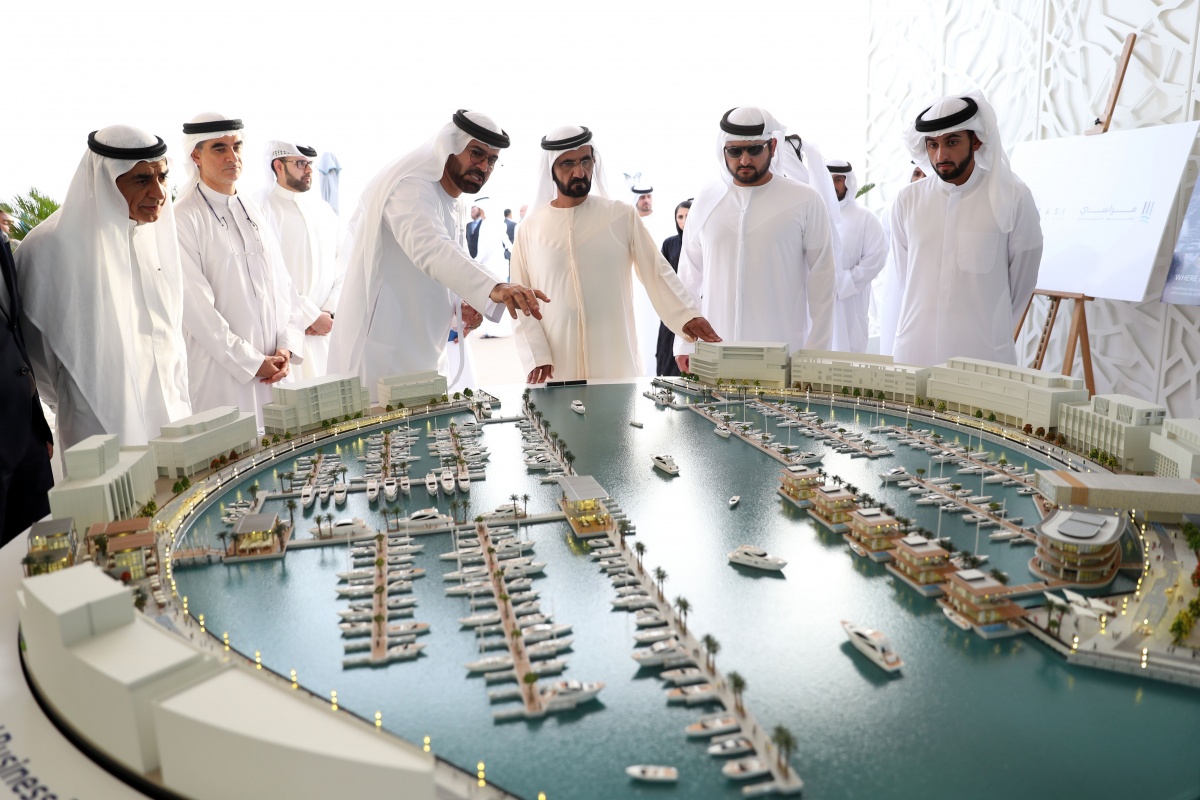 Mohammad Abdullah Al Gergawi briefing Sheikh Mohammed bin Rashid on Marasi Drive project by Dubai Holding
Mohammad Abdullah Al Gergawi briefing Sheikh Mohammed bin Rashid on Marasi Drive project by Dubai Holding
In 2017, he announced the end of his mission in Dubai Holding to focus entirely on governmental work. The value of Dubai Holding’s assets at the time amounted to 130 billion dirhams with offices in 21 countries, which had begun with a loan of $ 200 million. Given his pivotal contributions to the development of the business sector, Dubai Holding’s Chairman Mohammad Al Gergawi was chosen to chair the World Economic Forum on growth that was held in China in 2007, in addition to being co-chair in the India Economic Summit in 2005.
He founded the Young Arab Leaders Organization in 2004, which aimed to empower and qualify hundreds of young Arab leaders from various sectors.
On the global front, Al Gergawi is member of the World Economic Forum’s (WEF) Leadership Council concerned with supervising the long-term strategy of the Forum and its various platforms and the co-chair of the Global Future Councils, which are organized in partnership between the UAE government and the World Economic Forum. As a result of his contributions to the design of new and flexible models for future governments, he was selected as a member of the “Higher International Committee for Digital Cooperation” of the Secretary-General of the United Nations, which aims to set foundations and standards that help governments meet the challenges resulting from the rapid technological development.
To succeed in a rapidly changing world with an evolving economy, there must be effective strategies, one of the most important pillars of which is attracting talent. In a speech at the World Government Summit 2019, Al Gergawi said, “We are moving today from the age of information to the age of imagination, and from the knowledge-based economy to the economy of creativity. Ideas will not carry a certain nationality, and they will not be bounded by borders; the best ideas will migrate while their owners are living in their countries.” And as an embodiment of this global trend, Al Gergawi has overseen the launch of many events and initiatives to attract talent to drive the economic development movement in Dubai and the UAE. Thus, Dubai has become a home for creative ideas and a place for migrant minds who are looking for opportunities and a safe habitat to launch and develop their businesses.
He is a member of several committees concerned with the development of the national economy. He is the Vice-Chairman of the Dubai’s Securities and Exchange Higher Committee and the Chairman of the Family Business Sustainability Committee. These were some of the prominent posts in the economic journey of Mohammad Al Gergawi, which contributed to making Dubai an unrivaled global power.
The foundations of his economic outlook:
*Creativity and innovation are not achieved by resorting to safe choices and the trodden paths, but rather by taking risks and exploring the roads less traveled.
*Work as an entrepreneur and deviate from traditional roles, with an entrepreneurial spirit that embraces persistence, risk-taking, learning from mistakes, and focusing on results.
*His business methodology is based on building “Cluster Economy” that embraces thousands of companies in fields related to each other, attracting hundreds of thousands of talented people in the sectors of knowledge, media, technology, and medicine, and driving Dubai’s economy.
